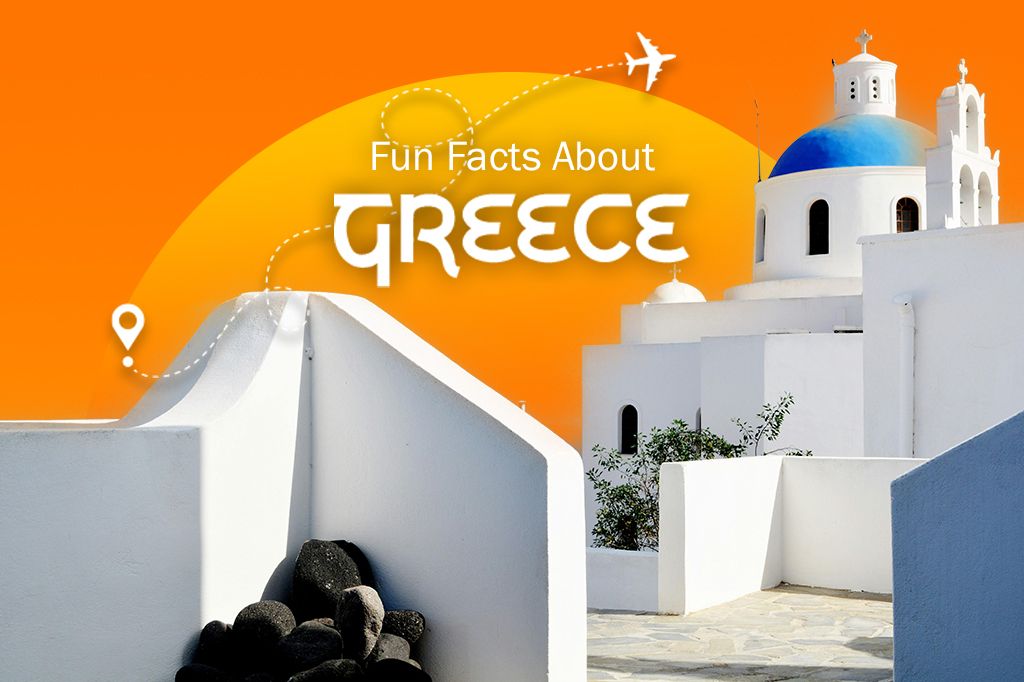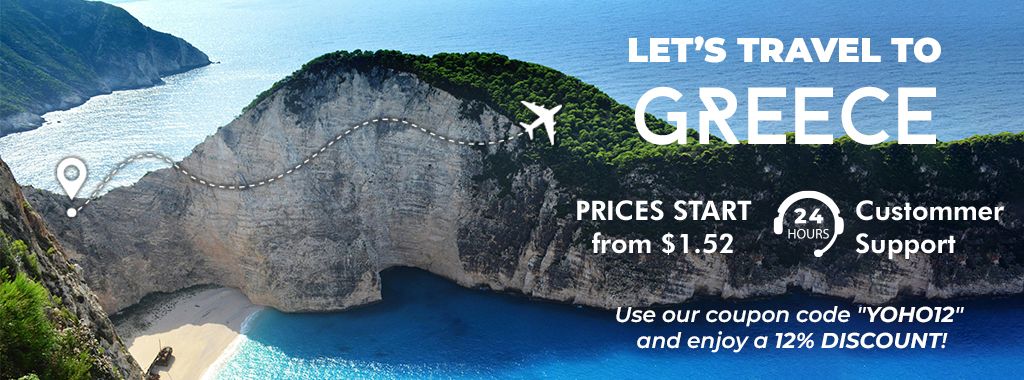Greece is famous for its beautiful beaches and ancient ruins, but there are many surprising, interesting, and fun facts about the country too. If you’re curious about these unique facts and more, this article will probably surprise you!
Stay Connected While Visiting Greece with Yoho Mobile
Heading to Greece to see the sights, relax on the beaches, or explore historic sites? Stay connected while you travel—try Yoho Mobile’s free eSIM trial and get instant access to mobile data in over most countries. No SIM card, no contracts—just a quick setup and you’re online in minutes.
If you want to get your eSIM plan afterwards, use the code YOHO12 at checkout for a 12% discount!
20 Fun Facts About Greece
Greece’s 6,000 Islands: Only 250 Are Inhabited
Greece has about 6,000 islands, but only around 250 are inhabited. These islands are grouped into areas like the Cyclades, Dodecanese, and Ionian Islands. The largest and most populated island is Crete, while smaller islands, such as Kastellorizo, have very few people living on them.
Many of Greece’s islands are either uninhabited or have very few people living on them. Some are used for farming or tourism, while others are left untouched because they’re too small or lack resources. The islands that are inhabited often have traditional villages, historical landmarks, and booming tourism industries, which play an important role in the country’s economy.
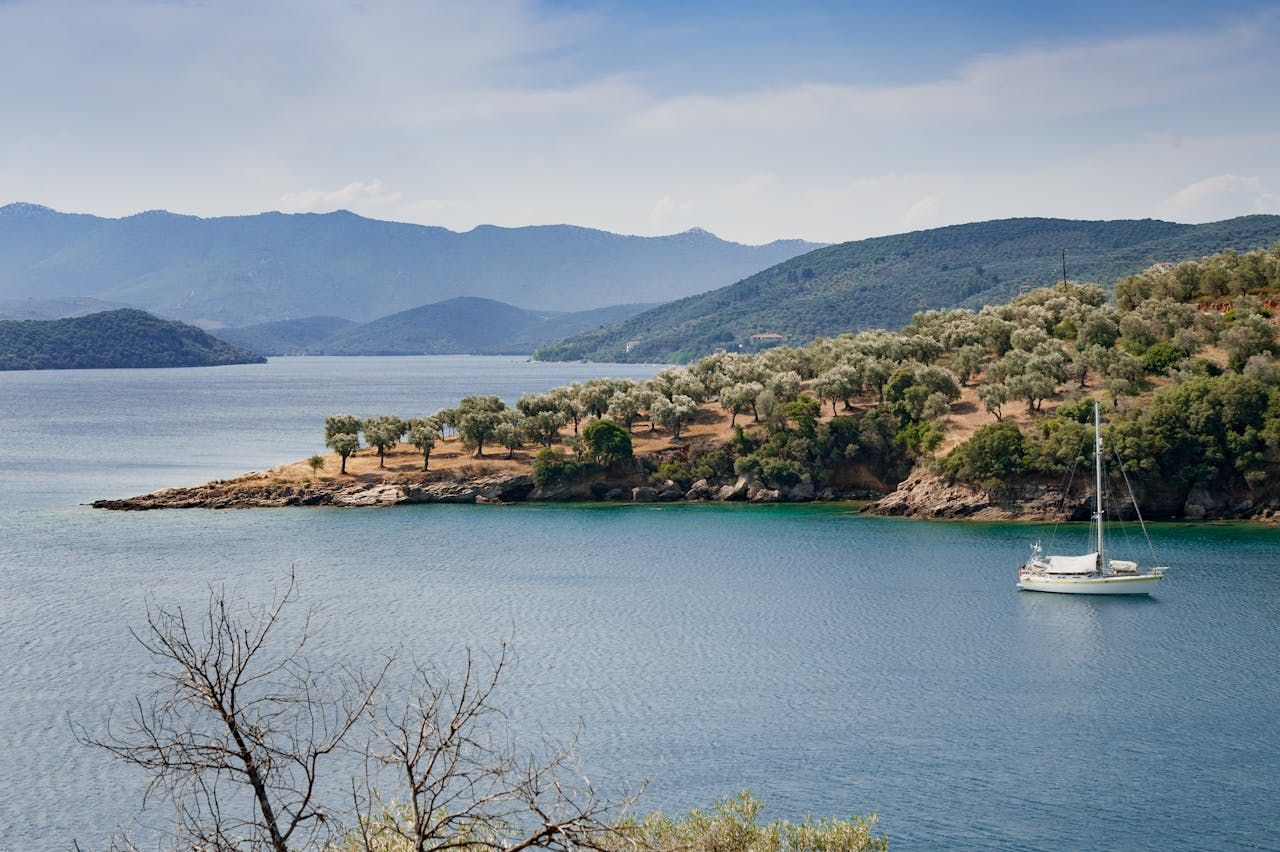
An interesting fact about Greece: The smallest inhabited island in Greece is Bartholomew Island, which only has a few residents, and it’s known for its lighthouse. Photo by mali maeder
The Greek Flag Represents Freedom
The Greek flag is a striking symbol of the nation’s history and values, with its nine blue and white horizontal stripes and a white cross in the top left corner. The cross represents Greek Orthodox Christianity, a central aspect of Greek identity. The nine stripes are often thought to reflect the syllables of the phrase “Freedom or Death,” which was the rallying cry of the Greek Revolution against Ottoman rule. The blue and white colors are symbolic of the country’s natural beauty, representing the sky and sea that surround the land.
The flag was first adopted in 1822 during Greece’s fight for independence, and the design we recognize today was officially established in 1978.
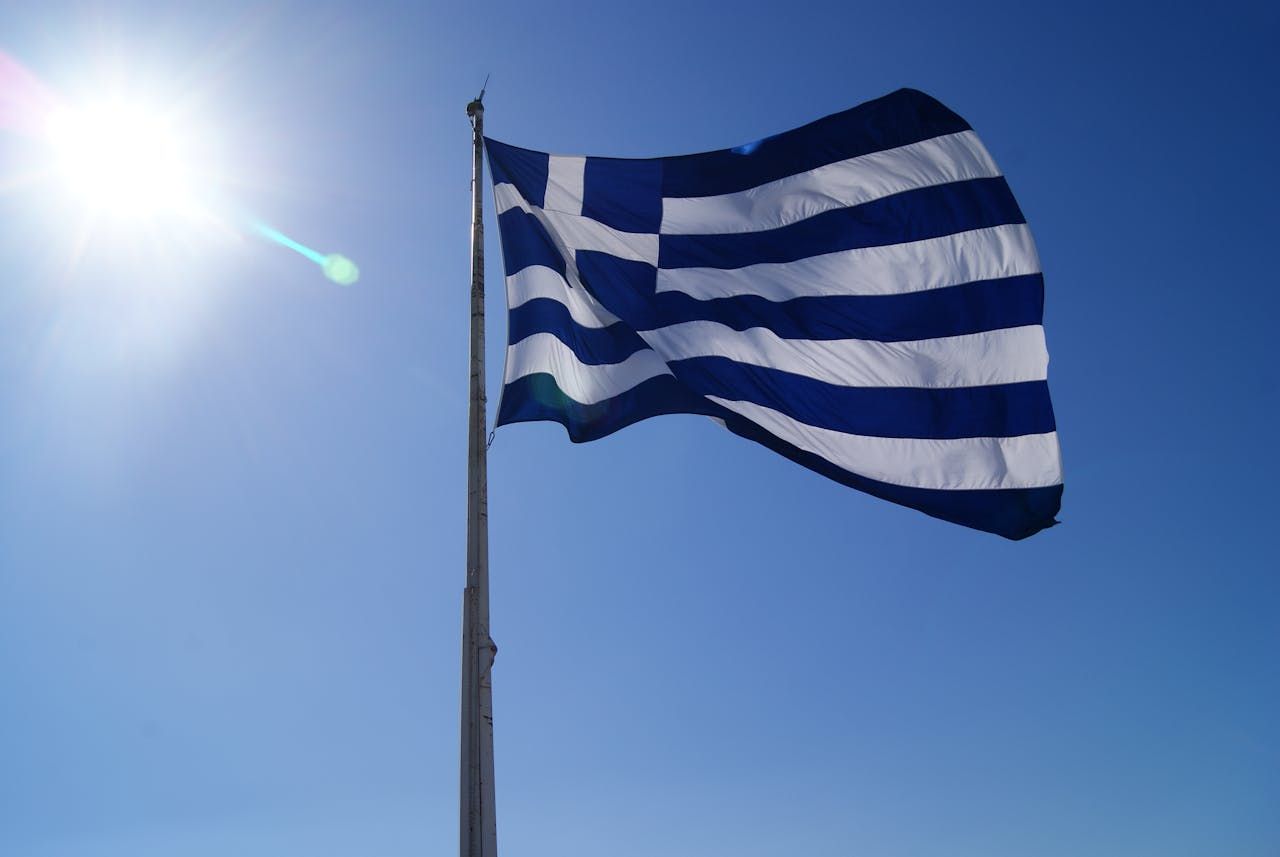
80% of Greece is Covered by Mountains
Greece is a very mountainous country, with about 80% of its land covered in mountains. The Pindus mountain range runs through the mainland and reaches into Crete and the Peloponnese. The highest mountain is Mount Olympus, standing at 2,917 meters. The mountains have created many valleys, canyons, and rugged coastlines. Some of Greece’s islands are actually the peaks of mountains that are underwater. These mountains not only shape the country’s natural beauty but also its history and culture.
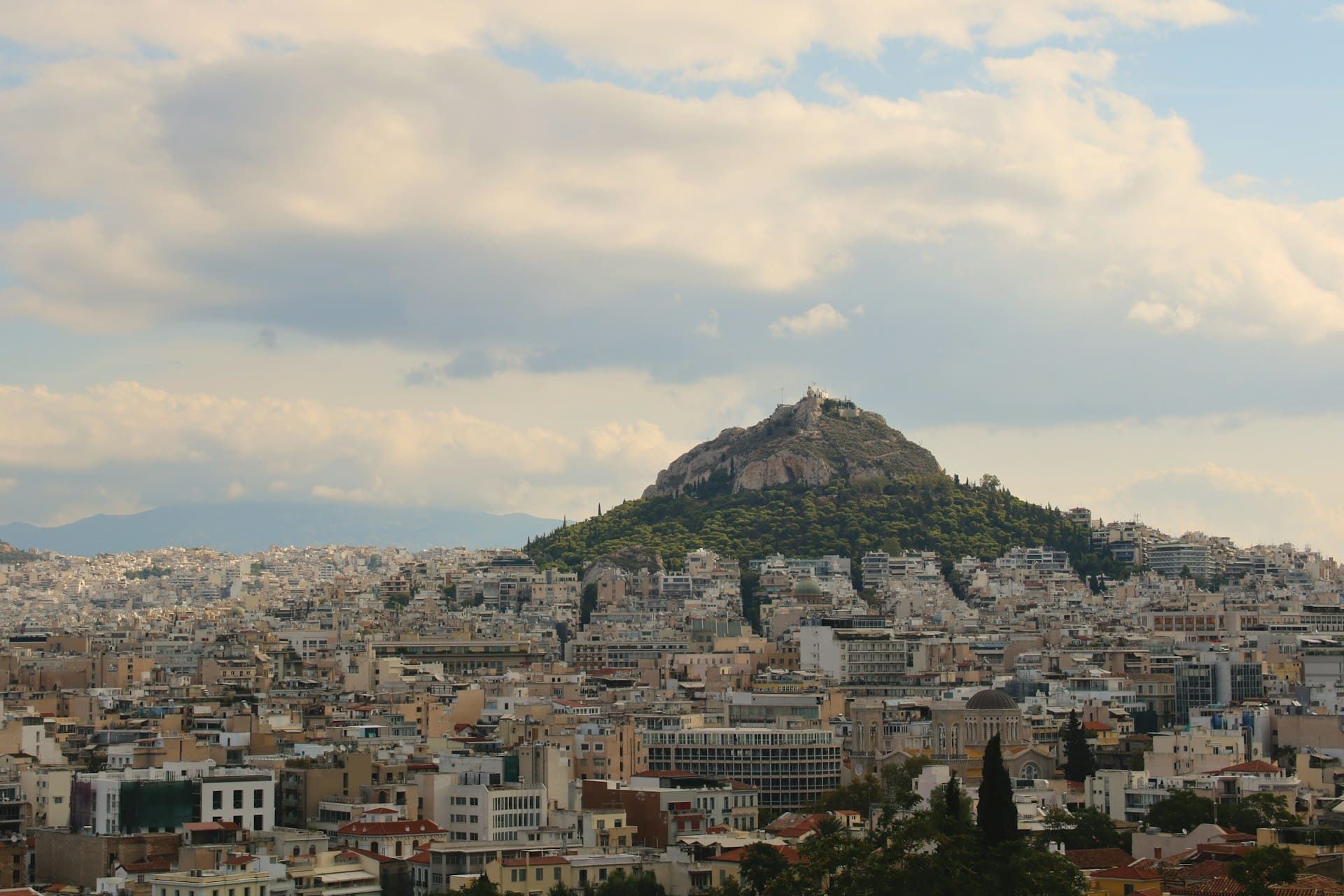
A fun fact about Greece is that, in Greek mythology, Mount Olympus is the home of the 12 Olympian gods, including Zeus, Hera, and Apollo, and is considered the center of the ancient Greek pantheon. Photo by Bruna Santos on Unsplash
Greece’s Coastline Spans 16,000 Kilometers
Greece has the longest coastline in the Mediterranean and the 11th longest in the world, stretching for about 13,676 kilometers. This includes the mainland as well as more than 6,000 islands. The coastline is diverse, with sandy beaches, rocky cliffs, and lots of little bays and coves.
Unfortunately, a third of Greece’s coastline is being gradually eroded, and climate change has made this problem worse. This coastline is crucial to Greece, as it supports vital industries like tourism, fishing, and maritime trade. It’s not just an economic asset but also a key part of the country’s culture and way of life. The loss of land along the coast could have serious impacts on these industries, which many people rely on for jobs and income, while also affecting Greece’s identity and heritage.
Athens is One of Europe’s Oldest Inhabited Cities
Athens is one of the world’s oldest cities, with a history that spans over 5,000 years. It was an important part of the Mycenaean civilization around 1400 BCE and later became a powerful city-state in ancient Greece. Athens is known as the birthplace of democracy and greatly influenced Western culture and ideas, especially during the 5th century BCE. Throughout history, it was controlled by various groups such as the Byzantines, Crusaders, and Ottomans, before eventually becoming the capital of modern Greece in the 1800s.
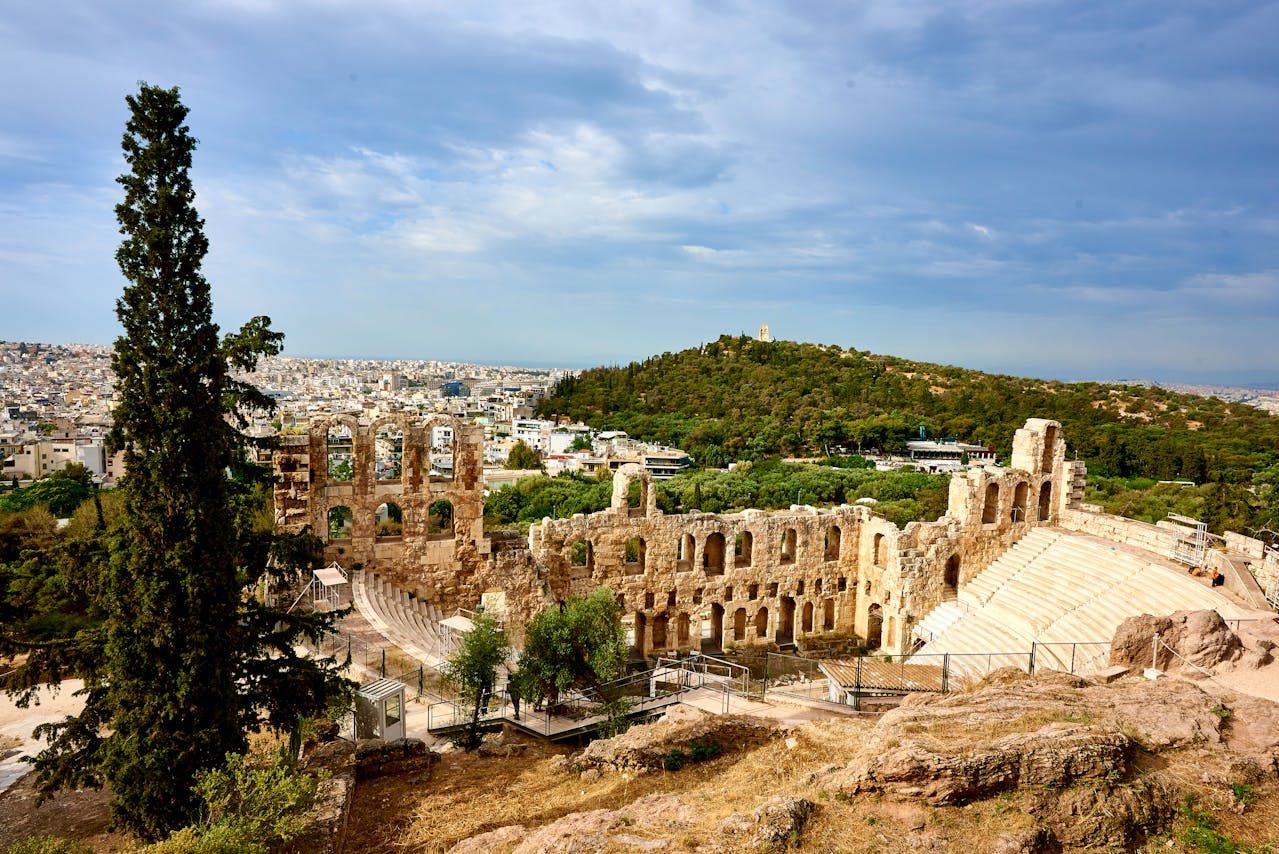
While Athens might not be the absolute oldest (cities like Plovdiv also claim that title), it had a huge influence on culture, democracy, and philosophy. Photo by Josiah Lewis
Greece is Home to 18 UNESCO World Heritage Sites
Greece has 19 sites that are recognized by UNESCO as World Heritage Sites. These sites are important for their historical, cultural, or natural value. Out of the 19, 17 are cultural sites, which include well-known places like the Acropolis of Athens, Delphi (an ancient religious site), and Olympia (where the Olympic Games began).
There are also 2 mixed sites, which means they have both cultural and natural significance—these are Meteora (famous for its monasteries on top of rock formations) and Mount Athos (a mountain that is home to many monasteries). The most recent addition to the list was the Zagori Cultural Landscape, which was added in 2023.
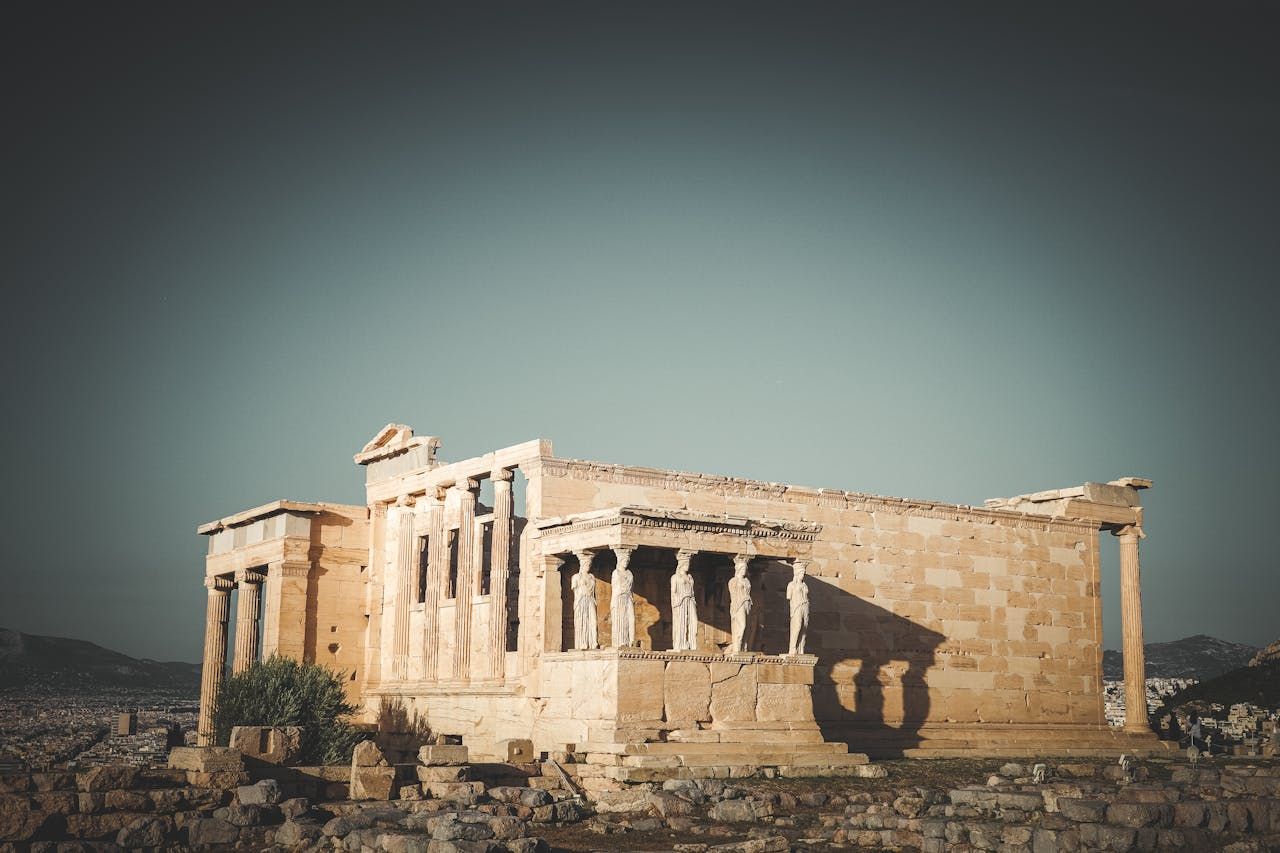
A fun fact about Greece is that it joined the UNESCO World Heritage Convention in 1981, which meant its important places could be chosen to be on the World Heritage list. Photo by Peter Holmboe
Santorini is The World’s Only Inhabited Caldera
Santorini is an island in Greece, located in the southern part of the Aegean Sea. It’s unique because it sits inside a volcanic caldera, which is a large, steep crater left after a big volcanic eruption (happened around 1600 BCE). Santorini is made up of the main island, Thera, as well as smaller nearby islands like Therasia, Aspronisi, and the volcanic islands of Nea Kameni and Palea Kameni. The island’s distinctive volcanic landscape, with dramatic cliffs and beautiful beaches, draws both locals and tourists who are fascinated by its natural beauty.
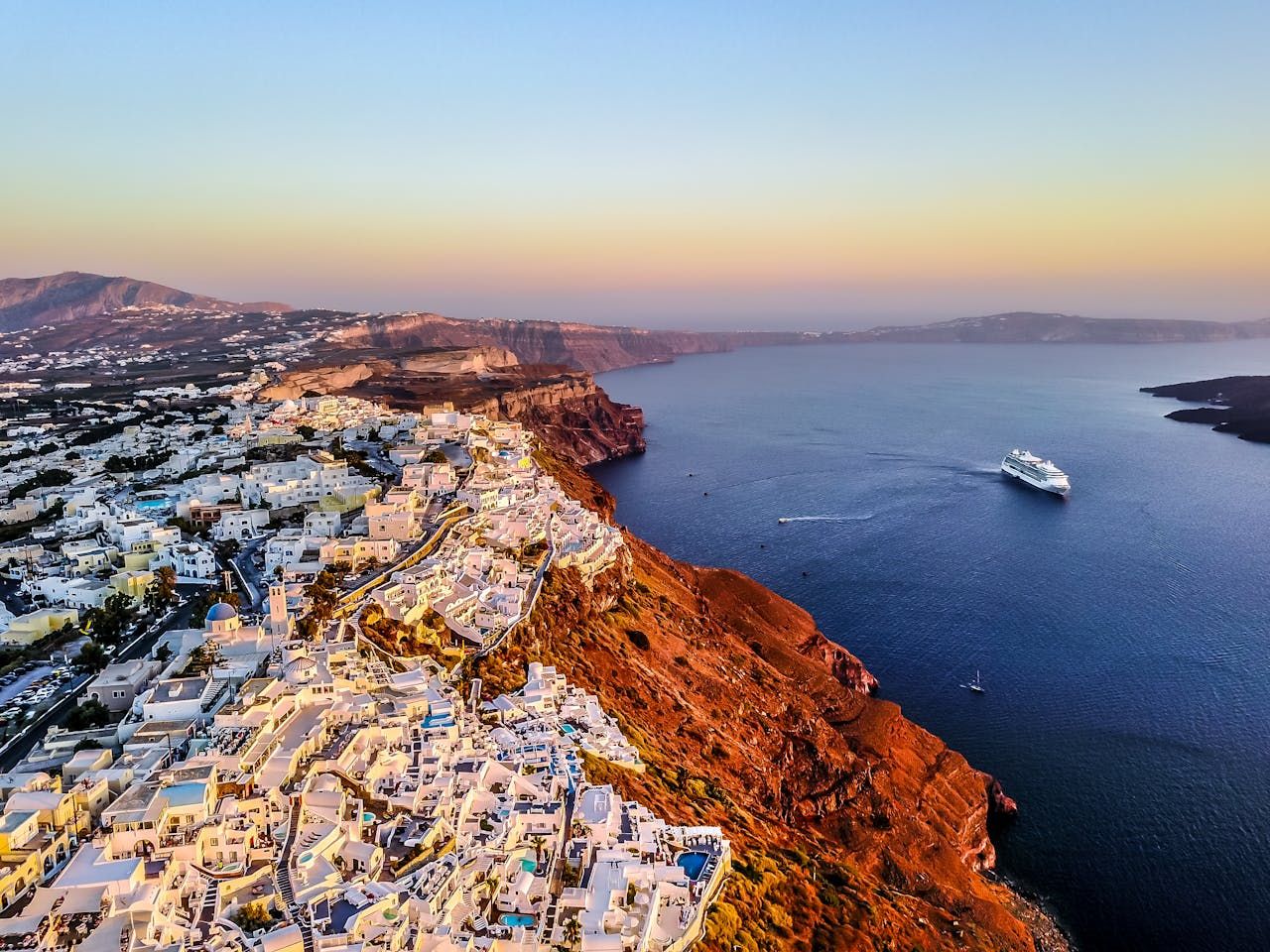
A surprising fact about Greece’s Santorini is that it has very few trees due to its dry climate and volcanic soil, but this gives it a unique, barren beauty. Photo by Nextvoyage
The Olympic Games Began in Greece
The Olympic Games started in Olympia, Greece, in 776 BC as a festival to honor the god Zeus. The first event was a footrace of about 192 meters, which was won by Koroibos of Elis, a Greek athlete. The Games, held every four years, became a major part of Greek culture and continued for almost 1,200 years. They included more events over time, such as wrestling, boxing, and chariot racing. However, they were stopped in 393 AD by the Roman Emperor Theodosius I. The Olympics were brought back in 1896 in Athens as the modern version of the Games we know today.
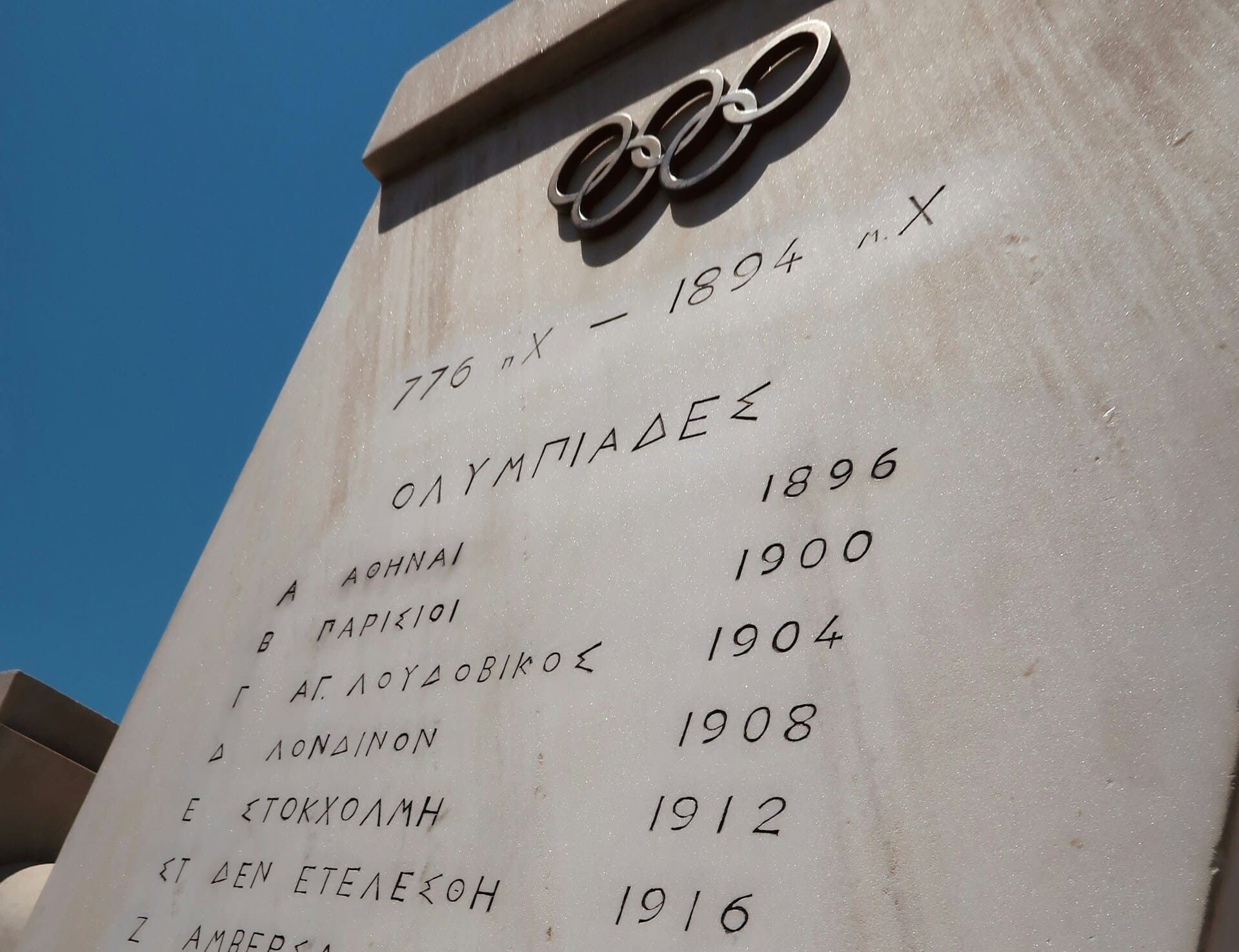
Photo by Julio Hernández on Unsplash
The word “gymnasium” comes from the Greek word “gymnos,” which means “naked” because athletes in ancient Greece trained and competed without clothes. Ancient Greeks loved gymnastics, and it was a big part of their culture, focusing on getting fit and staying disciplined. Gymnasiums were places for training athletes and having talks, helping both the body and the mind. This shows how much physical education mattered in ancient Greece and how it has influenced today’s sports and education.
Ancient Greeks Practiced Democracy First
Democracy first developed in ancient Greece, especially in Athens, around the 6th century BC. Before this, most societies were ruled by kings or small groups of elites. Solon, a leader in 594 BC, made reforms that allowed citizens to take part in decision-making, like writing laws and managing public affairs. Later, in 507 BC, Cleisthenes introduced the idea of “demokratia,” meaning “rule by the people.” This system allowed all free male citizens to vote and be involved in government, which was very different from the systems used in other places at the time.
Athenian democracy was direct, meaning citizens didn’t just elect leaders but made decisions themselves in assemblies. Over time, many other Greek city-states started to adopt some form of democracy. However, in 322 BC, when the Macedonians took over Athens, they ended its democratic system. Still, the basic ideas of democracy, like citizen participation and equal rights, influenced future political systems, including those we use today.
Theater Was Invented by the Ancient Greeks
Theater started in ancient Greece around the 6th century BCE, especially in Athens, as part of festivals that celebrated Dionysus, the god of wine, fertility, and celebration. These festivals included performances of choral songs called dithyrambs, which were sung by groups of people. Over time, Thespis, who is considered the first actor, began speaking alone, turning the performances into what we now know as drama. This marked the beginning of acting as a solo activity, instead of just group singing.
Greek theater grew into three main types: tragedy (which dealt with serious themes), comedy (which was humorous), and satyr plays (which were a mix of comedy and satire). Well-known playwrights like Aeschylus, Sophocles, Euripides, and Aristophanes wrote many of these plays and helped shape the foundation of Western theater.
Greece Has Over 120 Million Olive Trees
Greece has a huge number of olive trees (probably about 150 million) and they cover up to 60% of the country’s land. The main areas where olives are grown are the Peloponnese and Crete. Olive farming in Greece goes back thousands of years, and some olive trees are over 1,000 years old!
The country is famous for its high-quality olive oil, which is made from over 150 different types of olives, including popular varieties like Koroneiki, Kalamata, and Manaki.
Greeks Celebrate Name Days, Not Just Birthdays
In Greece, name days (yiorti) are a special tradition that’s often celebrated more than birthdays. Every person has a name day, which is tied to the feast day of the Christian saint they are named after. For example, if your name is Maria, you would celebrate your name day on August 15, which is the Assumption of Mary, the saint you’re named after.
This tradition is deeply rooted in the country’s Orthodox Christian faith. In many Greek homes, you’ll find name day calendars that list all the saints and the days people named after them celebrate. Even workplaces recognize name days, and it’s common for colleagues to acknowledge and celebrate each other’s name days.
100,000 Birds Migrate to Greek Wetlands Annually
Greek wetlands, like the Gialova Lagoon in southwestern Greece, are important stops for birds migrating between Europe, Africa, and Asia. These areas provide birds with a place to rest and feed during their long journey. The Gialova Lagoon, which is recognized as an Important Bird Area, is home to many bird species, especially during the spring and autumn migrations.
A study found 149 bird species in a wetland, including 66 species of waterbirds, with more variety during spring migration. The wetland, located on the Balkan Peninsula, is an especially important stopping point for birds flying across the Mediterranean Sea. Birds need fresh water and good habitats to thrive, and spring provides the best environment for them to rest and eat before continuing their journey.
Greece Has More Archaeological Museums Than Any Country
Greece has more than 110 archaeological museums, more than any other country, and they store and display important objects from ancient Greek history, including items from a very early time to the end of ancient Greece. Some of the most well-known museums are the Acropolis Museum, the National Archaeological Museum, and the museums in places like Delphi and Olympia. Inside these museums, you can find sculptures, paintings, pottery, and precious objects from famous ancient sites, such as Knossos and Vergina.
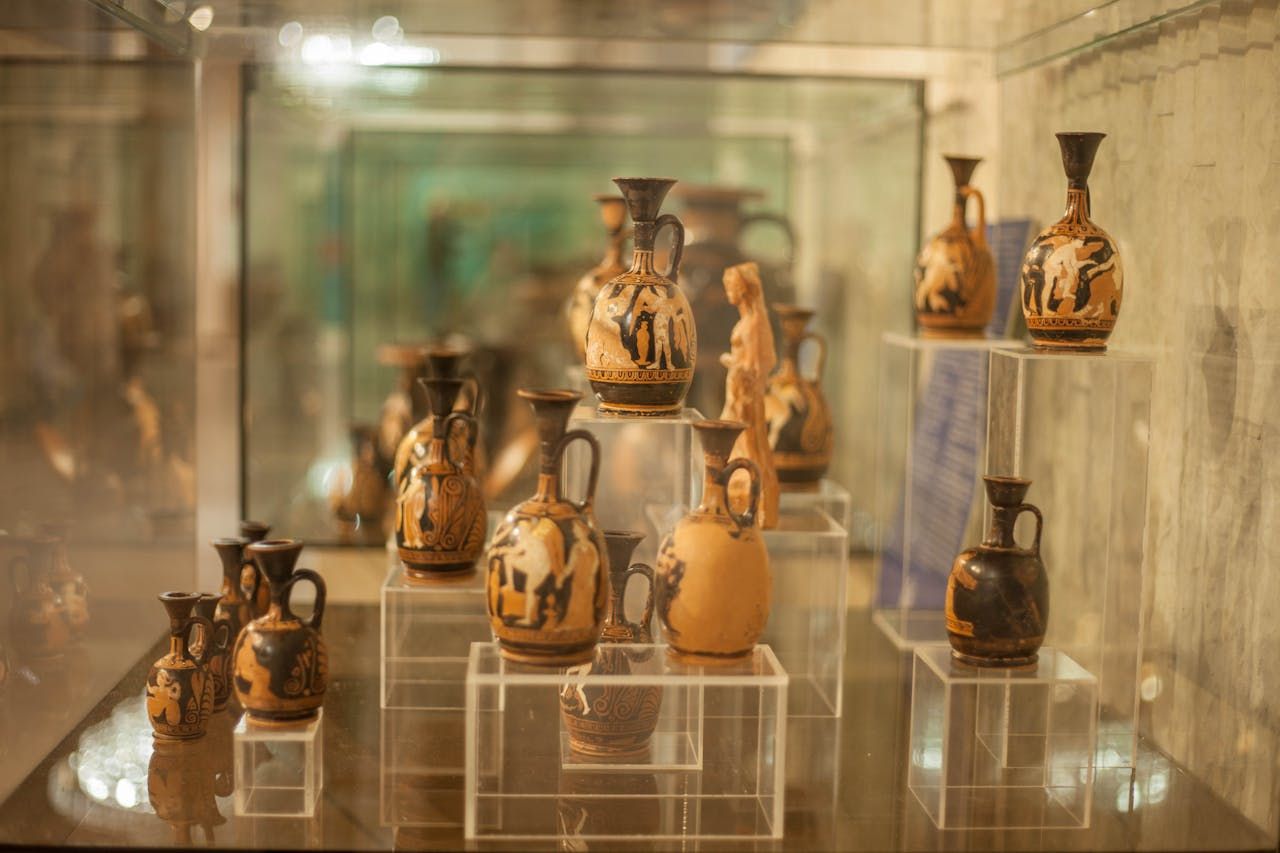
These museums are a way to learn about Greece’s history and how its culture has influenced the development of Western civilization. Photo by Rainer Eck
The Greek Alphabet Is Over 3,000 Years Old
The Greek alphabet was created around 800 BCE, based on the Phoenician alphabet, but with important changes, like adding vowels. This made it easier to read and write compared to earlier systems. Before this, the Mycenaean civilization used a writing system called Linear B, which disappeared around the 13th century BCE. The first long Greek inscriptions appeared around 740–730 BCE.
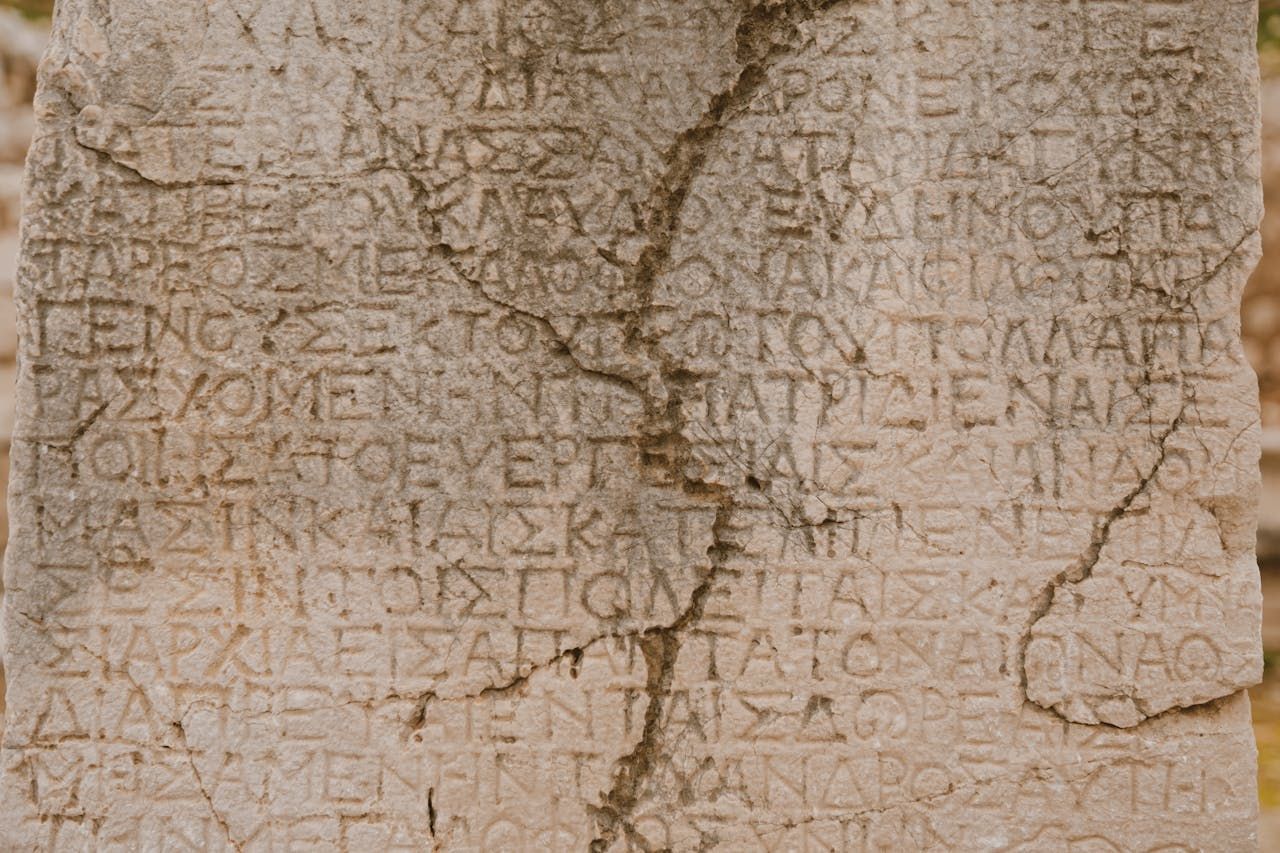
An interesting fact about the Greek alphabet is that it was the first to have letters representing specific sounds, making communication clearer and shaping many later alphabets, including the one we use today. Photo by ROMAN ODINTSOV
No Part of Greece Is Far From the Sea
In Greece, you’re never too far from the sea. The farthest point from the coast is about 137 kilometers (83 miles) away, which isn’t very far when you think about it. The village of Psarades is the most inland settlement in the country. Greece has a huge coastline, stretching 13,676 kilometers, the longest in the Mediterranean. This is because Greece is made up of a large mainland and hundreds of islands, meaning most places are close to the water. Because of this, the sea is very important to Greece—people rely on it for fishing, shipping, and tourism. The sea also has a big influence on the country’s culture, traditions, and economy.
Unique and Random Facts About Greece
- Ancient Greeks believed beans contained the souls of the dead and avoided eating them.
- Greek law bans high heels at some archaeological sites to protect ancient ruins.
- The ancient Greeks invented the alarm clock using water clocks with mechanisms to make noise and wake people up.
- Greeks are some of the world’s biggest cheese consumers.
- Ancient Greeks bathed in olive oil for grooming and skincare, believing it had health benefits.
- Greeks break plates to celebrate good luck and scare away evil spirits.
- Archestratus, a Greek poet, wrote the first cookbook in 350 BC.
- Greece is known for its café culture, with coffee spots in every city and village.

